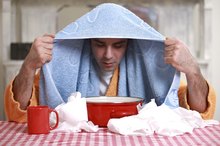Cough Sounds Like Fluid in the Chest After Running
Going for a run can clear your mind, strengthen your muscles and burn off calories, but sometimes you might feel worse after running instead of better. A wet cough is unpleasant and downright irritating, but it's not necessarily a sign of a serious medical condition. You might be able to get your post-exercise cough to go away on its own. If it persists, a visit to the doctor is in order 2.
If you are experiencing serious medical symptoms, seek emergency treatment immediately.
Causes
If you feel or hear what seems like fluid or phlegm with each cough, you have what's called a productive cough. You likely have mucus trapped in your airways, which your body is trying to expel. A productive cough can be caused by the common cold, the flu or a sinus infection. Running makes you breathe more quickly, so it can further irritate mucus-coated airways. You might also experience a coughing fit if you have exercise-induced asthma. Chronic bronchitis also causes productive coughing, particularly after exercising, but according to the U.S. National Library of Medicine, you must have a cough on most days of a three-month period to be diagnosed with chronic bronchitis 1.
- If you feel or hear what seems like fluid or phlegm with each cough, you have what's called a productive cough.
- Chronic bronchitis also causes productive coughing, particularly after exercising, but according to the U.S. National Library of Medicine, you must have a cough on most days of a three-month period to be diagnosed with chronic bronchitis 1.
Running Routines
Does Jogging Help Get Rid of a Cough?
Learn More
Even if you only cough after running, you may feel congested for at least a few days when your body's fighting off any infection. Hang up your running shoes for as long as the congestion lasts; according to the Mayo Clinic, it's generally safe to exercise when you have cold symptoms above the neck, like a headache and runny nose, but any congestion warrants rest 2. As soon as your chest feels clear, you can hit the pavement again, but it's wise to reduce the intensity and length of your run for the first few days. If your cough is caused by a chronic issue, you'll need to talk to your doctor about solutions that will make running easier for you.
- Even if you only cough after running, you may feel congested for at least a few days when your body's fighting off any infection.
- Hang up your running shoes for as long as the congestion lasts; according to the Mayo Clinic, it's generally safe to exercise when you have cold symptoms above the neck, like a headache and runny nose, but any congestion warrants rest 2.
Treatment for Occasional Coughs
The best thing to do when you have a productive cough that's caused by a cold or other respiratory infection is to let the mucus come up. Cough up as much as you can; your doctor might recommend you take an expectorant, which thins the mucus and makes it easier to cough up. You might also find that running a humidifier loosens the phlegm as well. You'll also need to treat the infection that's causing the cough. Resting and drinking fluids are generally all that's required to clear up these infections, though in severe cases your doctor might prescribe antibiotics.
- The best thing to do when you have a productive cough that's caused by a cold or other respiratory infection is to let the mucus come up.
- Cough up as much as you can; your doctor might recommend you take an expectorant, which thins the mucus and makes it easier to cough up.
Treatment for Chronic Coughs
Cardio Exercises & Sinus Pressure
Learn More
When you finish every run coughing, you'll need more than rest to treat the underlying problem. If you're diagnosed with chronic bronchitis or exercise-induced asthma, your doctor may recommend you use an inhaler called a bronchodilator, which dilates your lungs so you can breathe more easily. If you have chronic bronchitis, the doctor might also recommend you work with a respiratory therapist or practice certain breathing techniques. You don't have to give up running, since exercise can strengthen the lungs and improve your condition. If asthma is to blame, you might find that doing a thorough warm-up, breathing through your nose or running only in warm temperatures helps prevent a post-run productive cough.
- When you finish every run coughing, you'll need more than rest to treat the underlying problem.
- If you're diagnosed with chronic bronchitis or exercise-induced asthma, your doctor may recommend you use an inhaler called a bronchodilator, which dilates your lungs so you can breathe more easily.
Related Articles
References
- U.S. National Library of Medicine: Medline Plus: Bronchitis
- Mayo Clinic: Is It OK to Exercise If I Have a Cold?
- FamilyDoctor.org: Chronic Bronchitis: Treatment
- Martin MJ, Harrison TW. Causes of chronic productive cough: an approach to management. Respir Med. 2015;109(9):1105-13. doi:10.1016/j.rmed.2015.05.020
- Mahashur A. Chronic dry cough: diagnostic and management approaches. Lung India. 2015;32(1):44-9. doi:10.4103/0970-2113.148450
- Smith J, Woodcock A, Houghton L. New developments in reflux-associated cough. Lung. 2010;188(Suppl 1):S81-6. doi:10.1007/s00408-009-9210-2
- Wang TY, Lo YL, Liu WT, et al. Chronic cough and obstructive sleep apnoea in a sleep laboratory-based pulmonary practice. Cough. 2013;9(1):24. doi:10.1186/1745-9974-9-24
- Kenn K, Balkissoon R. Vocal cord dysfunction: what do we know?. Eur Respir J. 2011;37(1):194-200. doi:10.1183/09031936.00192809
- De Blasio F, Virchow JC, Polverino M, et al. Cough management: a practical approach. Cough. 2011;7(1):7. doi:10.1186/1745-9974-7-7
Writer Bio
Max Roman Dilthey is a science, health and culture writer currently pursuing a master's of sustainability science. Based in Massachusetts, he blogs about cycling at MaxTheCyclist.com.








